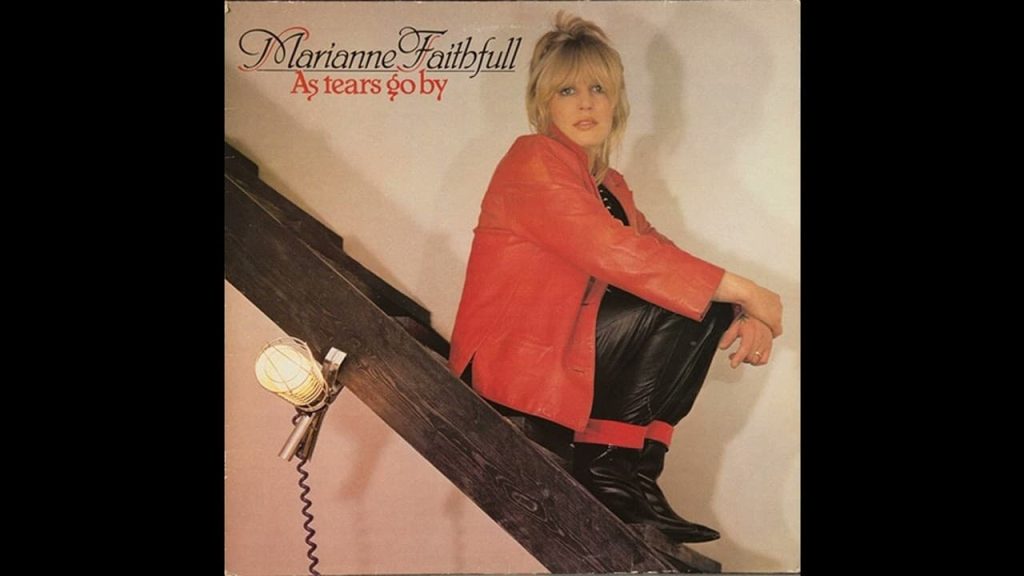
A Timeless Elegy of Heartbreak and Reflection: “As Tears Go By” by Marianne Faithfull
In the storied tapestry of 1960s pop and rock, few songs encapsulate the bittersweet nature of love and loss as poignantly as “As Tears Go By” by Marianne Faithfull. Released in 1964, this haunting ballad marked a turning point not only in Faithfull’s career but also in the way delicate, introspective emotions were expressed in popular music. Penned by the legendary songwriting team of Mick Jagger and Keith Richards—the creative forces of The Rolling Stones—along with their manager Andrew Loog Oldham, the song exudes a melancholic beauty that remains deeply resonant decades later.
From the very first gentle strum of the acoustic guitar, “As Tears Go By” draws the listener into a reflective state of mind. Marianne Faithfull’s rendition is imbued with a raw, vulnerable sincerity that sets it apart from the more raucous rock numbers of its time. Her expressive, smoky vocals transform the lyrics into a vivid portrayal of a heart weighed down by memories, regret, and the inevitable passage of time. There is an intimacy in her performance that seems to capture the essence of a moment when love has slipped away, leaving behind only the quiet echoes of what once was.
Lyrically, the song speaks to the universal experience of watching life’s beautiful moments fade into bittersweet memories. Its verses gently explore the ephemeral nature of happiness and the inescapable sorrow that comes with the end of romance. As each tear falls, the song suggests, so does a piece of the past—a poignant reminder that time, while healing, also transforms every cherished moment into a memory tinged with loss. This delicate balance of beauty and melancholy is what makes “As Tears Go By” an enduring classic.
The impact of Marianne Faithfull’s version was immediate and profound. Upon its release in the United Kingdom, the single soared to number nine on both the UK and Irish singles charts, capturing the hearts of a generation that was beginning to grapple with the complexities of modern love. At a time when the pop landscape was dominated by upbeat, energetic tunes, Faithfull’s somber, reflective ballad offered a new kind of emotional depth—a soulful introspection that resonated with those who had experienced the tender pain of parting.
Interestingly, the song’s legacy was further enriched when The Rolling Stones recorded their own rendition later on. Their version, which appeared on the American album December’s Children (And Everybody’s), reached number six on the Billboard Hot 100 singles chart. This fascinating duality—the song’s existence in two distinct musical interpretations—underscores its versatility and universal appeal. While Faithfull’s version remains a tender, personal lament, The Rolling Stones’ take adds a slightly edgier, more rock-inflected dimension to the ballad, yet both renditions share the same deep emotional core.
For those who lived through the 1960s, “As Tears Go By” is more than just a song; it is a powerful reminder of a time when music served as an intimate confidante to the joys and sorrows of everyday life. Its enduring charm lies in its ability to speak to the heart, transcending the bounds of its era to touch listeners across generations. Whether recalled during quiet moments of reflection or rediscovered by a new audience exploring the rich history of pop and rock, the song continues to evoke a sense of wistful nostalgia—a longing for days when every emotion was felt more deeply, every goodbye more poignant.
In every note and every lyric, “As Tears Go By” invites us to acknowledge that life’s beauty is often interlaced with moments of heartache. It encourages us to reflect on our own journeys, to remember that while love may fade, its memory remains etched in our hearts, growing richer with time. Marianne Faithfull’s timeless performance endures as a soulful testament to the delicate interplay between joy and sorrow, a classic elegy that reminds us that sometimes, the most profound truths are whispered softly as tears go by.